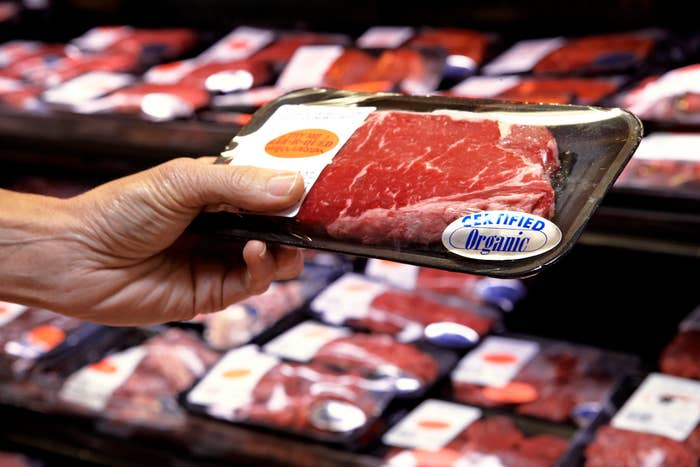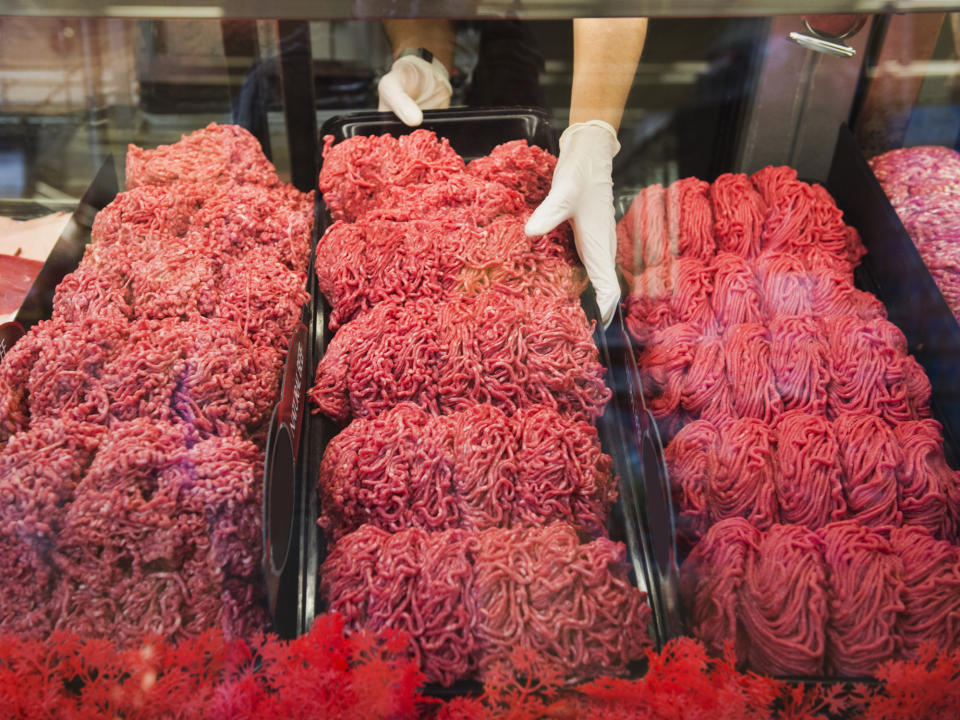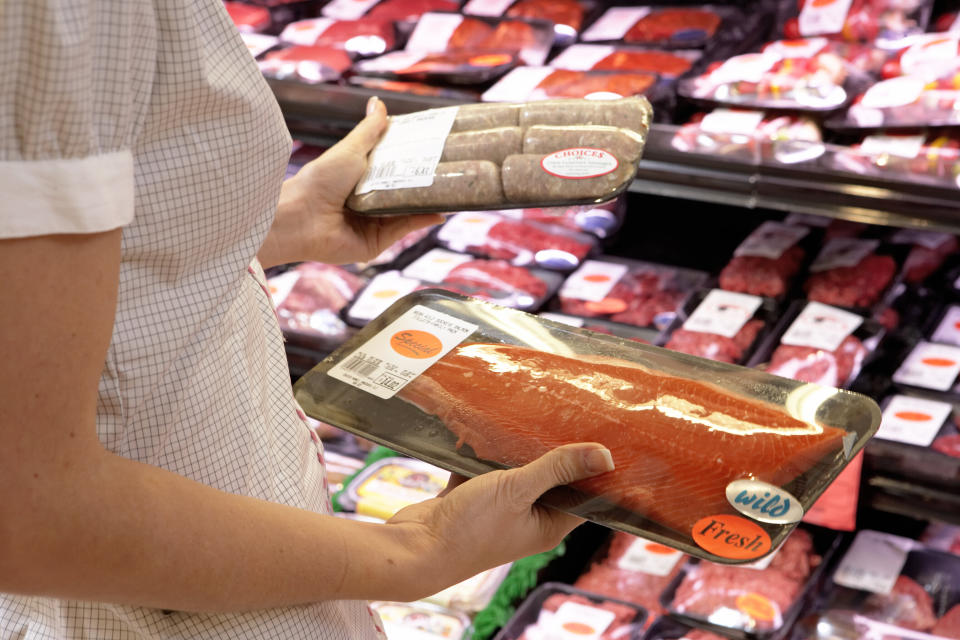"The Risk Of Contamination Is Significantly Higher": Here Are 5 Types Of Meat That Butchers Won't Buy At The Grocery Store

If you’re a meat eater shopping for dinner ingredients, heading to the butcher counter or refrigerated aisle at the grocery store is often the most convenient and affordable way to stock up on proteins. But according to professional butchers, the meat quality available in a grocery store or supermarket often falls below the standard that you’ll find at butcher shops that specialize in well-sourced animal products.
“The main difference between a butcher shop and a grocery store is the attention to detail that a butcher shop provides, beginning with prioritizing sourcing quality over the price,” said Mike Saperstein, co-owner of Sunshine Provisions in South Florida.
As Saperstein suggests, buying meat from specialty butchers can be a pricey endeavor. However, James Peisker, co-founder of Porter Road, reminds us the higher price tags exist because “small butcher shops all over the country do a lot of extra work to seek out farms that take care of the land and the animals, which makes a better-for-you and better-tasting product.”
Specialty butchers also have the skill set to cut meat more precisely than their grocery store counterparts. “The skilled tradespeople have worked hard to know and understand the different cuts,” Peisker said. “That knowledge and quality should be worth paying a little extra and supporting.”
When we spoke with professional butchers, they generally acknowledged that most American shoppers will buy meat at the grocery store at some point, and that they can generally get satisfactory products that way. But for the following five meat cuts and meat-related items, butchers urge you to steer clear of the supermarket and visit a butcher shop instead.

Ground Beef And Poultry
Because ground meats tend to be lower-cost than premium cuts and are usually used for dishes like burgers, meatloaf and meatballs (which involve other ingredients and toppings that obscure the meat’s flavor), we assumed that our experts would say it’s fine to purchase them at grocery stores. But butcher Luis Mata said, “Ground meat products, particularly ground beef and chicken, are items I would avoid purchasing from grocery store butcher counters. The bulk of these products come pre-ground from large meat processing facilities, where the risk of contamination is significantly higher.” Mata tells us these contamination risks can cause foodborne illness and have, in some cases, “led to widespread recalls of products across vast geographic regions.”
By purchasing ground beef and poultry from butchers, you can both “reduce the risk of contamination but also ensure freshness and quality,” Mata said. Specialty butchers source their meat from smaller vendors, so they know how the animals are raised, how the meat is processed, and exactly what goes into each ground blend.
“Grocery store ground beef typically arrives pre-ground directly from slaughterhouses, where a mixture of various cuts — and not necessarily the best ones — is used. This process can compromise the flavor and quality of the meat,” Mata said. He pointed out that quality butchers usually grind their own meat and use “trimmings of premium muscles.”
“This method allows them to control the quality and fat content of the ground beef, ensuring a superior product,” he said.
‘Fresh’ Fish And Seafood
Grocery stores have been upping their game in the seafood department lately, with plenty of in-store butcher counters offering fish and shellfish that they advertise as “fresh.”

You may be better off buying frozen.
But unless you’re buying from a grocery store that’s very close to a body of water, Rusty Bowers, owner and master butcher of Pine Street Market in Decatur, Georgia, warns that it’s worth questioning the “freshness” of grocery store seafood.
“My general rule of thumb is that if you cannot do a quick 20-minute drive from the beach to that store, then buy your seafood from the freezer case” instead of the meat counter, Bowers said. He told us that, if visiting a dedicated fishmonger isn’t an option, frozen seafood is a better purchase because “most frozen seafood (as stated on the label) is processed and flash frozen on the boat to preserve its freshness shortly after being harvested from the sea.”
“We have all walked past that land-locked grocery store fresh seafood case that smells like low tide on a hot day,” Bowers added. “Please be careful.”
Aged Beef
Aged beef is beloved among meat eaters for its tender texture and robust flavor. Artisanal butchers have used aging processes for centuries, and as conversations about beef aging move into the mainstream, we now see grocery stores trying to get in on the game.
But according to Rich Silverman, head butcher of The Lambing Shed Farm Shop & Kitchen in Cheshire, England, supermarkets don’t have the time, equipment or setup to age their meats in a beneficial manner. “Local butchers have the time and space to dry-age the meat by hanging it on the bone as a full carcass. This is a far superior way of aging meat and gives a much more superior taste to the product. There is a lot less moisture in it, so it cooks better. This is a tried and tested method, done by butchers all over the world for centuries,” Silverman explained.
Grocery stores, however, tend to age their beef using “wet aging.” Silverman describes this process as involving “meat [that’s] pre-cut in packaging and then aged in that packaging.”
“So when you see a label saying ‘21-day-aged’ in the supermarket, it’s not done on the carcass, so it’s not dry,” he said. “It’s done so the moisture can’t escape, so when you are cooking it, the moisture will steam the meat from the inside, making it chewy.”

ribeye steak in the butcher's shop window
‘Bone-In’ Meat Cuts
Cuts of meat sold on-the-bone are a treat for flavorful braising, and the leftover bones can be used for homemade stock. However, Jerry Rempe, master butcher at Omaha Steaks, mentions that bone-in meat available in grocery store meat cases “tends to ‘sour’ more quickly than boneless products depending on the age of meats and how they’re stored.” The presence of the bone affects the meat’s pH, which can lead to “a foul smell, slimy texture, and sometimes a change in color,” he said. “The sour smell often comes from the production of organic acids by the bacteria as they break down the proteins and fats in the meat.”
Rempe told us meat can go bone sour “due to the amount of air, enzymes and other compounds that affect it if the bone is in a region of the carcass that is not reached quickly and effectively by the refrigeration.” Because grocery store meat cuts typically aren’t flash-frozen, the clock begins to tick down on their freshness the moment they’re cut and packaged. Meat cases at supermarkets don’t have exact temperature precision, and packaged meat can sit there for more than a day, so the odds of bone sourness are higher than they’d be at a smaller craft butcher who replaces meat daily or at a larger operation that engages in flash-freezing.
Pâté, Terrine And Organ Meats
Some upscale grocery stores now carry liver, kidneys, sweetbreads and housemade pâté and terrine, which may seem like good news to those of us who love the richness and funk of organ meats. But Rosangela Teodoro, owner and butcher of Teodora’s Boucherie in Cohasset, Massachusetts, encourages shoppers to consider visiting a butcher who specializes in these tricky-to-prepare cuts.
“As a specialty gourmet butcher, I also have trained expertise in customization and trimming required for specific cuts of meat. I use specialized equipment and maintain the meats at a consistent temperature to prevent spoilage. [That’s why] I would never purchase pâté and terrine from a grocery store butcher, as they require specialized equipment and expertise to prepare properly,” Teodoro said.
When it comes to organs, executive chef Jeanne Oleksiak of Herd Provisions Restaurant and Butcher Shop in Charleston, South Carolina, also points out that “they’re usually frozen [at grocery stores] and are not in high demand, so they spend a lot of time moving from freezer to freezer, especially if they’re on sale.” At an artisanal butcher shop, organs are more likely to be freshly sourced and stored in optimal conditions.
This article originally appeared on HuffPost.

 Yahoo Lifestyle
Yahoo Lifestyle 
